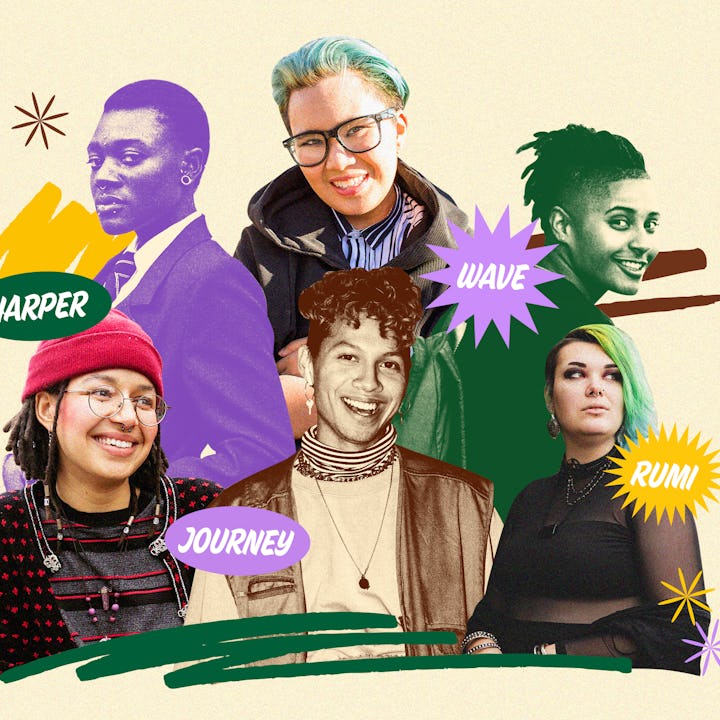Non-Binary Baby Names Are On The Rise. Here’s Why.
Two baby name experts share their thoughts on genuinely gender-free naming trends

Gender-neutral names have soared in popularity for several years, particularly as millennials have replaced Gen Xers as new parents. BabyCenter even declared 2015 the year of the gender-neutral baby, and data compiled by Net Credit that same year showed an 88 percent spike in gender-neutral names between 1985 and 2015. In 2018, Nameberry reported that Harper — once traditionally a boy’s name — squeezed Abigail out of the top 10 girls’ names for the first time in 17 years.
It seems, though, that these days, nonbinary baby names are gaining traction too, with some parents hoping to eliminate one aspect of gender identity altogether in favor of names with zero gender association or connotation. Curious about what differentiates a nonbinary baby name from a gender-neutral one? Here’s the scoop.
While there can be overlap between gender-neutral/unisex and nonbinary/post-gender names, generally speaking, nonbinary names are those that are truly gender neutral, used nearly equally for boys and girls and free of any gender identity. Where names like James, Charlie, and Wyatt have been increasingly used interchangeably for boys and girls in the past decade, nonbinary baby names might be a last name used as a first name, a nature-inspired name, a place name (after a street, city, or country), or a completely new name not rooted in any historical or cultural significance.
Some recent examples from famous parents are Hilary Duff and Matthew Koma’s daughter Banks, Beyonce and Jay-Z’s daughter Rumi, Reese Witherspoon and Jim Toth’s son Tennessee, Megan Fox and Brian Austin Green’s son Journey, and Cardi B and Offset’s son Wave. While these names might have familial or cultural significance, they are genuinely free of association with any specific gender binary.
Whether or not nonbinary names will tip naming trends on a large scale remains to be seen, but there are plenty of reasons why new parents might favor a truly gender-free moniker for their little ones — even if they do plan to keep other binary-based customs, such as referring to their son or daughter as such.
“Many parents want to avoid the pressure of choosing a name that will ‘define’ their child's gender identity,” says Lauren Levy, founder of the website Aden's Mom. “Choosing a gender-neutral name leaves the door open for their child to self-identify as male, female, or something else entirely when they get older. This can be seen as empowering for children, who may feel free to explore their own identity without feeling pigeon-holed by their name.”
She also noted that “many parents feel the traditional gendered naming system is outdated and unfair. They may believe that boys and girls should be treated equally from birth, so giving them a unisex name sends a message that gender doesn't define a person or their future. Third, with the increased visibility of gender fluid and transgender people in society, there is a growing awareness that not all people identify with the gender they were assigned at birth. As our understanding of gender expands beyond the traditional binary of male and female, more parents are looking for naming options that reflect this reality.”
Scott Rubin, author of Naming Your Little Geek, expands on this, particularly when it comes to a growing desire for nonbinary names. “Parents are feeling more freedom of expression in giving kids unique names, the continued rise of celebrities choosing non-standard names, the accessibility of finding names from other cultures and languages, and more. There are also a growing number of parents who are purposefully choosing non-gendered names as part of the gender-neutral baby movement (theybies)” — i.e., parents raising their children free of any gender or sex identity in the hopes they will choose what feels right for them in their own time.
Levy predicts nonbinary baby names will continue growing in popularity, but says “they will never fully replace the ‘classics’ that have continued to be trendy year over year. For example, names like Charlotte and James are just as popular today as they were in the 1800s. I don't see this changing anytime soon.” According to the Social Security Administration’s annual list of popular baby names, gendered baby names in the U.S. still largely reign supreme.
Just as there’s a growing understanding that gender can be fluid, so too are naming trends, and names themselves can be equally fluid. The gender connotation of many names tends to shift — names like Ashley, Shannon, Leslie, Shirley and Dana used to be traditionally assigned to baby boys, but now they’re largely assigned to baby girls. Even the concept of naming trends is relatively new: in past centuries, babies were typically named solely by religion or after a relative, and The Atlantic notes that it was only in 1947 when Americans began to choose names because they liked them and not because of any strong religious or familial ties.
Naming your little one might feel like a seriously tough decision, but choosing a name that feels special to you is what’s most important, no matter what trends or data dictate. As with all things parenting, do you.
This article was originally published on